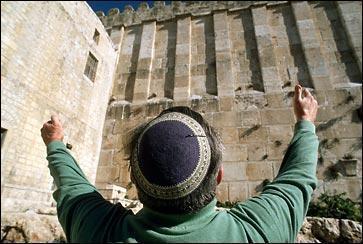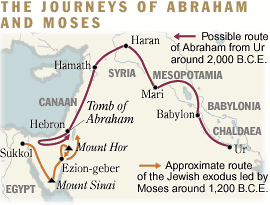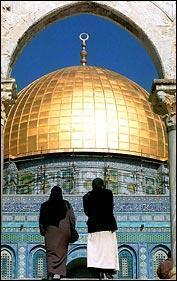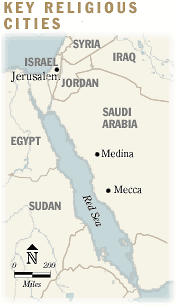 |
 |
|
||||||||
|
Sunday, May 12, 2002 Common roots An ancient bond It’s called the Holy Land, its ancient history dear to the world’s three main monotheistic religions — Judaism, Islam and Christianity. While many argue that the theological past has little to do with the nationalistic forces driving the region today, protection of religious areas and icons remains a rallying cry for the faithful.
Abraham, the Bible says, was called by God to leave his home and move to a new land, where he was to become the father of a mighty nation. His journey has become a tale of faith and transformation embraced by Judaism, Islam and Christianity. As the story goes, some 4,000 years ago Abraham traveled from the Chaldean city of Ur — in present-day Iraq — to the land of Canaan — essentially modern-day Israel, the West Bank and the Gaza Strip. The book of Genesis says God then spoke to Abraham in Canaan, saying: "To your offspring, I will give this land." Abraham's offspring included two sons. The first was Ishmael, whom he fathered with Hagar, his wife Sarah's former servant. The other was Isaac, whom he fathered with Sarah.
Jews believe they are descended from Isaac, who, as the legitimate son of Abraham, was the intended inheritor of God's promised land. Muslims believe they are descended from Ishmael, Abraham's first-born. They say Hagar was Abraham's second wife and believe their claims to the holy land are as valid as those of the Jews. Abraham is said to have lived 175 years, and then buried in a cave called Machpelah, in what is now the city of Hebron in the West Bank. Abraham has become revered by three religions. In the Christian New Testament, Abraham is called "the ancestor of all who believe." The Koran mentions Abraham more often than the prophet Mohammed, who is believed by Muslims to have been a direct descendant of Abraham. Jews see Abraham as the first person to recognize their God.
THE EXODUS
Famine drove the Israelites from Canaan to Egypt and then, as recounted in the book of Exodus, Moses led the Israelites out of Egypt and back to conquer Canaan around 1200 B.C.E. Until about 721 B.C.E., the Israelites ruled Canaan, calling it Israel in the north and Judea in the south, where they built their first temple in Jerusalem. Then the Israelites were conquered by the Assyrians and Babylonians, their temple destroyed and the Israelite tribes scattered. In 539 B.C.E., some Israelites returned to Jerusalem and built their second temple, which was subsequently destroyed by Romans in 70 C.E., after a Jewish revolt. The Jews were then expelled. This second expulsion is seen by many Jews as lasting about 2,000 years — until the creation of the state of Israel in 1948 — though small Jewish populations remained while the land was in the control of others. Palestinians have said their people lived in the land throughout history, and that their ancestors predate Abraham's arrival in Canaan.
NEW RELIGIONS
HOLY SITES But Islam's third-holiest site is in Jerusalem, in the area that holds the Al-Aqsa Mosque and Dome of the Rock. The Dome of the Rock covers a stone promontory from which Muslims believe Mohammed ascended on a miraculous night journey to heaven and back. Jews also revere the site, which is where they believe Abraham prepared to sacrifice his son Isaac, before being told by God that that no longer was necessary. The Al-Aqsa mosque, which was built around 700 C.E., sits across from the Dome of the Rock, which was completed about 15 years earlier. Both buildings sit on top of the small hill that held the two Israelite temples before they were destroyed. The Muslims refer to this hill as Haram al-Sharif, meaning "the noble sanctuary." Jews call the hill the Temple Mount, and consider one of the hill's retaining walls, the Western Wall, a holy shrine.
MANY CONQUESTS
Britain then ruled the area under a mandate from the League of Nations, and it was under Britain's watch that the modern struggle between Jews and Arabs for independent national homelands began.
Copyright © 2002 The Seattle Times Company
|
|
|||||||||||||||||||||||||||||||||||||||||||||||||||||||||||||||||||||||||||||||||||||||||||||
|
Two Peoples, One Land | Reader comments | Credits seattletimes.com home |



